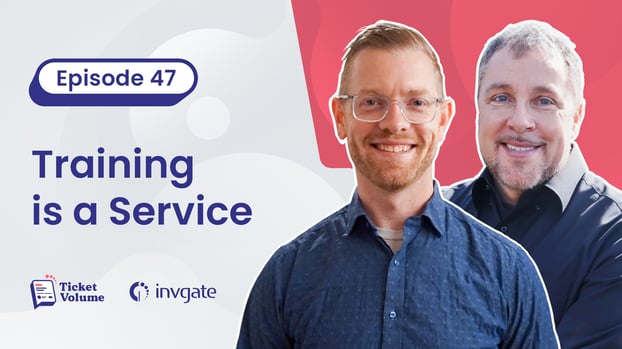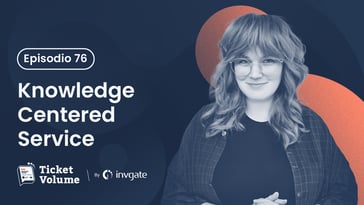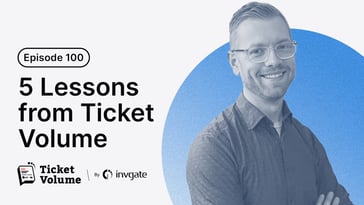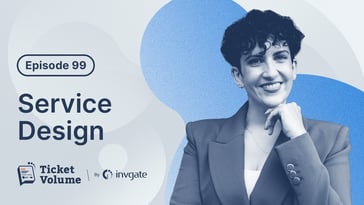Training has transformed into more than just a simple knowledge transfer. It has become a valuable service that can greatly enhance the teaching and learning experience. So much so that trainees are now taking an active role in their own learning, to ensure that they are getting the most out of the training service.
Sean McClean, a Master Technical Trainer and Training Evangelist at ServiceNow for 12 years, approaches training from both the trainer's and the trainee's perspective. He emphasized the value of knowing how to train an employee on the 47th Episode of Ticket Volume, our IT podcast.
McClean discussed the limitations of certifications and why they should not be relied upon solely. With almost 18 years of experience, he is not only a speaker but also considers himself a professional listener and avid seeker of certifications.
Make sure to tune in to the entire episode featuring McClean. He gave away excellent tips that you may want to rethink how to get the most value during training in service.
Moreover, you can sign up for our monthly live recordings and directly ask any questions during the session.

How to train an employee to get the most value
Training methods have come a long way over the years, evolving to meet the needs of diverse audiences and the ever-changing landscape of industries. One key factor in this evolution is the rise of virtual training, which allows for greater accessibility and flexibility. No longer bound by physical location or time constraints, individuals can now access training materials and resources from anywhere in the world.
But it's not just the delivery method that has changed; the approach to training has also become more personalized. One program that caught McClean’s attention is called "Rise Up." This innovative program focuses on reaching broader audiences with tailored training.
|
|
"I've pulled so many cool stories from so many experiences that have come from delivering teaching, but mostly because I was trying to learn about who they were or where they came from. It's a huge opportunity to broaden my experience, especially now when we have the need to re-skill and teach tech to a broader audience. We need to look to teach not the same class we've taught, but get to know people in a very different way. That changes both the class, the examples, the stories, everything. I love that." Sean McClean |
But out of all things, McClean believes is crucial to understand one key aspect of getting the most value from training as a service is adopting a dual perspective. Whether you are a trainer or a trainee, it is important to consider both sides. Trainers should actively listen to the needs and goals of the trainees, taking their feedback and concerns into account. This allows trainers to tailor the training experience to better meet the trainees' specific requirements, resulting in a more engaging and effective learning environment.
Now, when it comes to careers in IT, the traditional linear path is no longer the norm. Beran and McClean highlighted the importance of recognizing skills over titles when pursuing career growth. In an industry that is constantly evolving, having a diverse skill set is appreciated. Employers are increasingly valuing individuals who can adapt and learn new technologies quickly, rather than those who simply have a specific job title.
Certifications play a significant role in career development, providing quantitative proof of one's knowledge and expertise. McClean emphasized the three-legged stool approach to career growth. Certifications serve as the first leg, providing tangible evidence of skills. However, they are not the sole determining factor. Qualitative proof, such as hands-on experience, is equally important. And let's not forget the "Mojo" – those personal qualities that set individuals apart.
Building certifications strategically is key. It's not about collecting as many certifications as possible but rather choosing ones that complement your experience and personal growth. His advice is to align the certifications with your career goals to create a powerful combination that showcases your expertise and dedication.
Nevertheless, training is not just about acquiring knowledge; it's also about building a community and networking. McClean highlighted the value of engaging with communities to gain experience and learn from others in the industry. Also, mentorship plays a vital role in career development, and building relationships with peers and experts can open doors to new opportunities.
Attending conferences and events is another way to expand your network and stay up-to-date on industry trends. These gatherings provide a platform for learning, sharing ideas, and connecting with like-minded professionals.
As you can tell by now, training methods have evolved to cater to the diverse needs of individuals and industries. Virtual training, personalized approaches, and diverse skill sets are at the forefront of this evolution. Certifications, when strategically chosen, can serve as a powerful tool in career development.
However, it is the combination of certifications, experience, and personal qualities that truly sets individuals apart. And let's not forget the importance of community and networking – building relationships and engaging with peers and experts can provide invaluable support and opportunities for growth.
Finding the right candidate for a job
McClean was not holding on his wisdom. First of all, he clarified filters are incredibly helpful in the hiring process. They allow us to sift through a large pool of candidates and focus on those who meet our specific criteria. But it doesn't stop there. Experience and culture fit will eventually determining the right candidate for the job.
Second of all, he said sometimes having too many certifications can be misleading. While certifications demonstrate knowledge, they may not necessarily indicate practical skills. On the other hand, extensive experience can lead to outdated knowledge and limited adaptability. It's all about finding the right balance between certification and experience.
However, he defended certification does hold value for experienced professionals. It shows a commitment to staying current in their field and an ongoing pursuit of new knowledge. It helps round out the overall picture of an experienced professional and adds credibility to their expertise.
|
|
"When I talk about certification preparedness, one of the things I try to help people with is to not just study for the certification on their own, but to get involved in a community and practice the certification together. This way, they are killing two birds with one stone - they are getting the certification and also getting to know a network of people. This sounds a lot like experience, and it reminds me of the importance of being active in a community. I think certification only stands as a support for the other two - experience and community involvement." Sean McClean |
Now, let's talk about training careers. If you're starting or advancing in this field, he had some valuable advice for you. Engaging with online communities also provides incredible learning opportunities, and active participation helps build recognition and expertise.
Building a reputation through community engagement is key. For instance, you can start answering questions and engaging with others in online communities like Reddit, to establish yourself within your industry. This not only builds your reputation and recognition but also expands your audience and professional network.
Moving forward, are you able to recognize the opportunity gap?
Bottom line
There you have it, teaching is a service that requires understanding the needs and making connections to the students' context. But, this is just a summary of Ticket Volume's episode featuring Sean McClean. There's a lot more to discover in their conversation. Be sure to listen to the full discussion with Matt Beran to learn more about how to train an employee.
You can find the full episode on popular platforms like Apple Podcasts, Spotify, YouTube, or any other podcast platform you prefer. Remember to subscribe if you're interested in joining the monthly live recordings!















